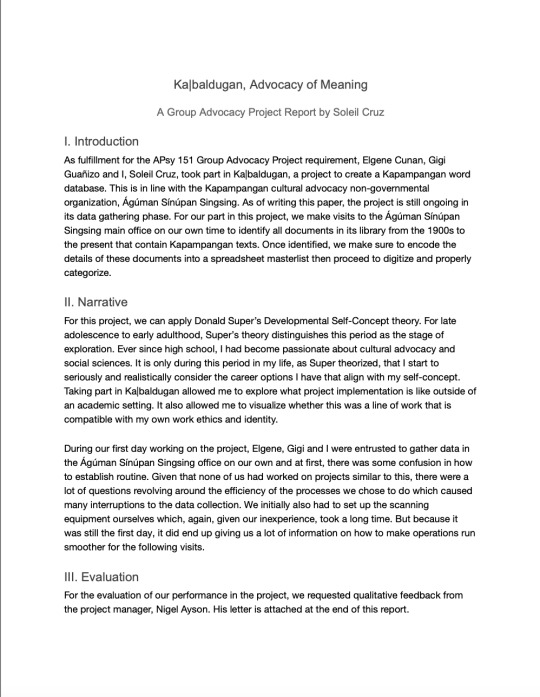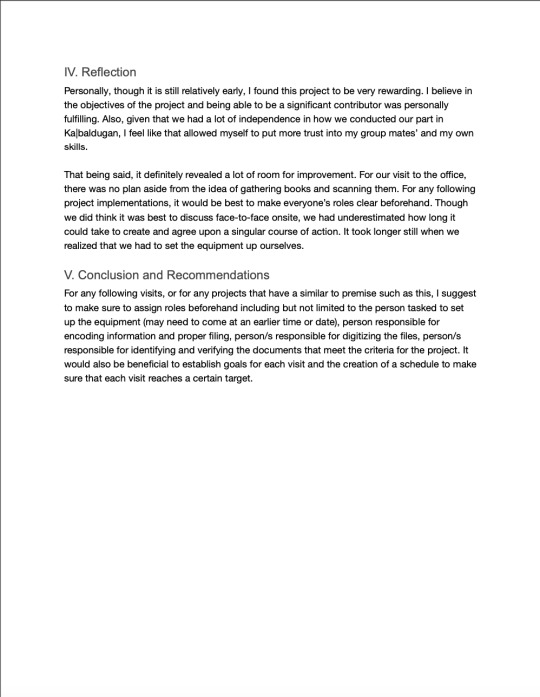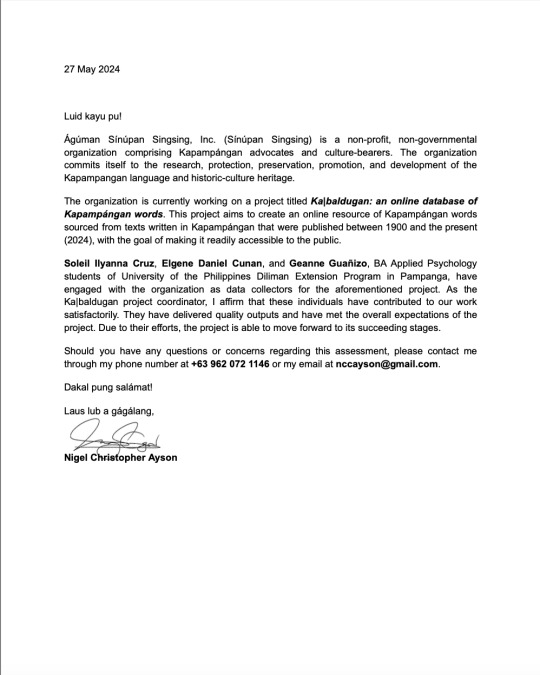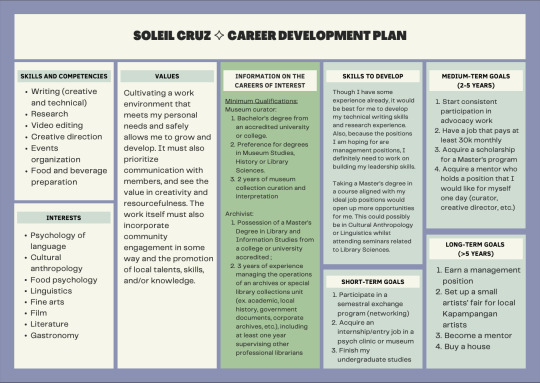Don't wanna be here? Send us removal request.
Text
For Prof Liezel
You can search the following tags to filter the posts:
#ejournal scruz — for the ejournal entries
#personal growth portfolio scruz — for the PGP requirements (CDP, Wellness Activity, Advoc Proj)
(i tried to post the advoc proj video but it was too big po)
0 notes
Text
ejournal 5
Will I ever be really healthy?
There's a way that people talk about health that almost makes it seem like a mythological creature. Always be in search of it, always seek it out, know that there will always be a way to be healthier. Especially if you take in all the "professionals" posting on the internet, there is always always a new diet to try, an old diet that is actually harmful, this certain vitamin you need more of, previous advice that are actually useless trends and so much more endless "guidance". It's become increasingly difficult for the average person to know who to trust and what actually is outdated advice and what is the best possible solution to staying healthy.
When it all gets overwhelming for me, it's always nice to take a deep breath and remind myself that it's healthy (pun intended) to question different sources. Science though it's a field we must trust, it's also always an ever-evolving one prone to human error. It's not perfect, just as is everything, but I have to remember that being healthy doesn't mean being perfect. It means living well and safe.
Generally speaking, the medical community suggests complex carbohydrates, a diverse diet, etc. When it comes to my health, adjusting my diet has always been more difficult to keep consistent compared to exercise but one thing this lesson has given me permission to do, is to at the very least, be more mindful of what I'm eating. Though, because I still live with my parents and in a dorm with the food paid for, I don't get much decision in what I consume. To make up for this, I can still decide how much rice I consume (if it matches the recommended amount of carbohydrates of the Pinggang Pinoy) or the speed of how I eat (making sure that I digest everything properly). There will always be ways in which I can control my health though there are still so many factors that are largely out of my control like genetics or pollution. It may difficult to gauge whether I truly am healthy in my life but if I'm able to run around painlessly and have a plate of food in front of me everyday, then these are all things in my life that I should never take for granted.
0 notes
Text
ejournal 4
i am not my thoughts
I once saw a funny internet post about how CBT is just gaslighting oneself to be mentally well. I had found myself laughing out loud at the simplification but there was kernel of truth in it that I couldn't stop thinking about. Even at an early age, I remember starting to experience intrusive thoughts (though I didn't have the language for it at the time). Thoughts like about how poorly people perceived me, how suspicious I was of others all the time or how poorly I perceived myself despite minimal or no external justifications.
At the time, I believed that those thoughts that kept entering my brain without warning meant that that was my true character and one way or another, my "evilness" was bound to come out once I'm unable to repress it further. When I learned the term "intrusive thoughts" and its meaning, I had actually cried. They might be mine, but I am not my thoughts. There is so much my brain is trying to get me to "foresee" so I could protect myself but for most of my life I couldn't view them with that purpose.
It's so easy to start a cycle of maladaptive thoughts
It's difficult to get it to stop. But, if one is able to use the guiding principles of Cognitive Behavioral Therapy, that's one small step in a long journey of letting yourself see the light. Through the emotion and the pain, it can be so important that we try to take in the situation as objectively as we can and regard ourselves with more kindness than we may usually do. It often barely matters if there are some corners in a room filled with darkness—shadows are only made in the existence of even the faintest warm glow. And, more importantly than any corny metaphor, there is a way for one to exist with meaning in that room, despite how we perceive it. There will always be light, there will always be shadow, there will always be color and sound and warmth and wind. Sometimes, we won't feel it even if we try and sometimes, we'll feel it too much. But in the end maybe it just matters that we keep on going and trying to see clearly as much as possible, whenever we can.
0 notes
Text
ejournal 3
the thing about other people
I have never been confident with my people skills. There's always a pressure for me to appear approachable or likable despite my true personality being very quiet (which some people take to mean I'm off-putting or that I don't like them). A lot of the time, I end up feeling guilty when I'm unable to keep up with this persona and am left standing there without anything to say to the other party. It's difficult to know what people want me to say and so even more difficult to actually say it. Sometimes, I'm even taking in everything but a lot of it goes over my head because ironically, I'm trying to make sure that I appear like I'm "engaged enough for them".
When the APsy 151 class reached the Active Listening lecture, I didn't have much expectations. But, after actually going through it and finding out little tricks to help people feel like you've empathized with them, it became one of my most immediately applied lessons. One of the most impactful pieces of advice the lesson gave was about paraphrasing (and the different ways to paraphrase). Taking the time to absorb what the other person has said and repeating it back to them, though its true purpose is to make sure that they feel you've understood their situation, had also become helpful for myself in real life with the way it guided my decision-making on how to move the conversation forward. Are they frustrated and want advice? Do they just want to vent? Expressing my understanding of their troubles helped to make for a fruitful conversation.
Leading was also very useful for me outside the classroom. As I've said, I've often felt pressure to present one way or another to satisfy the other person but it didn't actually ever occur to me that there's a way to listen to another person that still allowed for them to take the lead on how you're supposed to respond. Whenever I seek help in another person I'm always very clear about whether I want advice or merely just to vent and I have a tendency to feel more upset when it doesn't appear that the other person understands what I'm looking for despite explicitly expressing my intent. I always automatically project that to other people and become worried when I'm unsure what the other person wants from me but I had learned through the lecture, and the activity we had done, that sometimes, people don't know themselves what they want out of it so an active listener can do so much to not only give the other party what they're looking for, but to even help them figure what it actually is that they're looking for.
0 notes
Text
Holistic Wellness
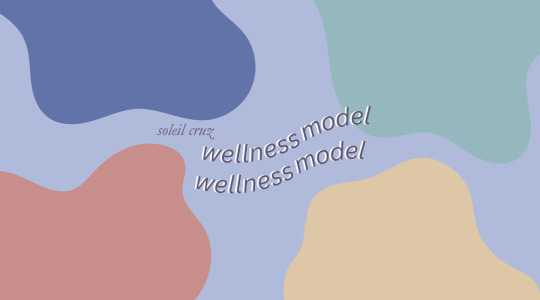
Some examples of goals I wanted to achieve over the course of the semester:
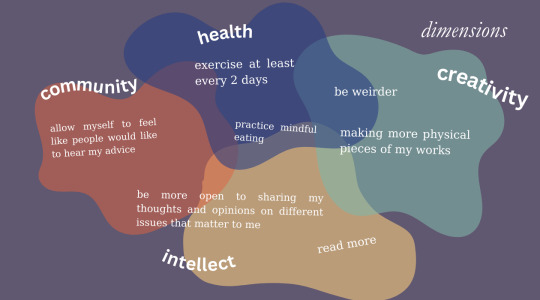
Some of the actual activities I was able to do to foster my wellness:
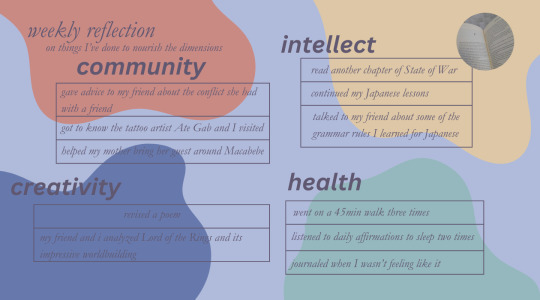
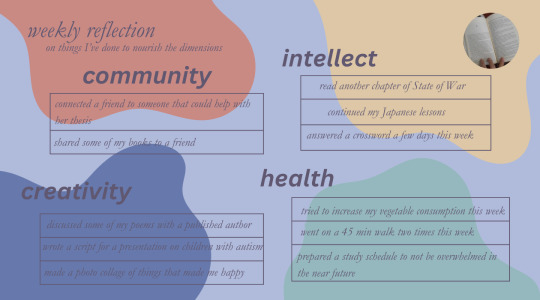
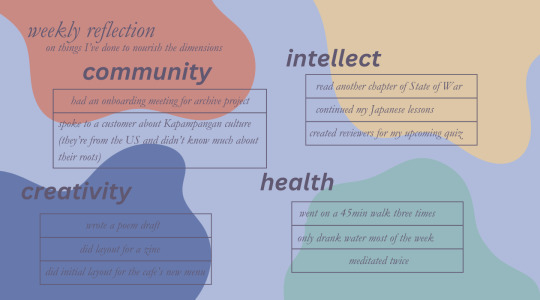
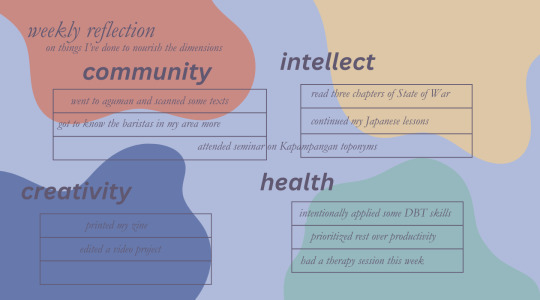
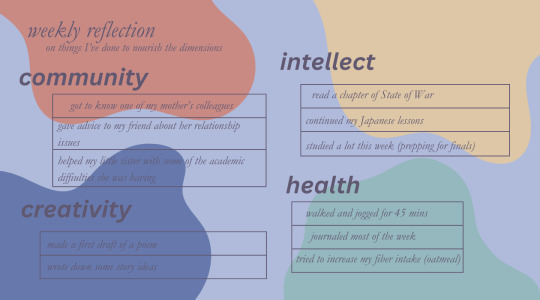
As expected, there were fluctuations in my consistency but overall it was nice to see that there were always activities I'd done to nurture my wellness
0 notes
Text
eJournal 2
grit and passion
I recall when I entered university, it was the pandemic, we were under lockdown, and I had to completely reevaluate myself as a student.
Reflecting on my development as a student throughout the years, I can recall a time when I had no ambitions at all. I did all my work and passed all my assessments but all I cared about was being told I was smart. I didn't join any competitions unless I was required to because I didn't like the idea of not being good at something from the get-go. Cut to high school where it got so much more competitive and it being an exclusive government school, I had to put in more efforts than I had before so I could keep my scholarship. This easily led to burnout and bouts of depression and anxiety. Long story short, I went through a massive realignment to figure out what my priorities actually were in life so that I could start enjoying it once more rather than just surviving it.
Little did I know, I started to cultivate a growth mindset.
I started to redefine what success to me looks like and had to look to those interests that I naturally gravitated to. I asked myself what it was about these things that added vitality to my life and how could I immerse myself in them in a more intentional way.
When it came to my academics, it's been monumentally helpful to consistently celebrate any progress made. Whether it's 10% or 80%, making even the smallest of increments in progress deserves to be acknowledged and allows me to feel proud that I've done something to help myself in the future. As someone who still experiences bouts of depression, preparing for a scenario that allows for my future self to do the least amount of effort possible makes me feel deeply taken cared of.
As long as I keep my health my number one priority, everything else will follow
The things I'm passionate about, from being the tool to empty myself over and over again, became what sustained me and breathed life back into me. When I stopped writing poetry with techniques and metaphors that I felt would impress my teachers, I started using it to express unspoken traumas that needed to be verbalized. When I stopped viewing my lessons as circus hoops that determined an audience's perception of me, I started to take them at my own pace and used them to serve my personal growth. In a meta-typical way, I've become really passionate about my own personhood and I've found that it was only through gentle nurturing of myself that I could cultivate resilience and build on my grit.
At the point I am in now, I've started to rely on this mindset that the things I'm passionate about don't need to be capitalized on for the sake of others or external benefits. In my experience, it's a sure way to make them feel meaningless or at least, have its value trivialized to equate how it can make living in a capitalist society advantageous. Toni Morrison once said "there's the work you do and the person you are". I like to hold onto those words when I start to feel like work consumes me. It may not be a common ideology but it's what gives me comfort and at the end of most days, that's all I could ask for.
0 notes
Text
eJournal 1
the dimensions of my own personal wellness
Back in 2020, the year of lockdowns and quarantines, the University of Maryland defined wellness as "more than health. It is a lifestyle and an approach to living fully". As far as I can remember, I've always been introspective. It's always felt like if I could analyze my own little quirks and depth then it meant that there was depth to dive into. It existed and I existed and there were things in my life that I could control as long as I had the power to articulate it into language. I was eyewitness, and whatever I said goes. As I grew older though, I did find out that being a witness to your own life is much different to living in wellness.
I think that when people are young, we get fed this idea that happiness is a singular goal that is achievable and once we obtain it, that is it. We're set. People don't often recognize that the life well-lived already exists in the small pockets of the everyday life. That wellness may be a parallel universe but only in the way that a molecule lives in this dimension naked to the human eye but in truth, makes up everything we love like the humming of last night's karaoke song or the taste of carabao's milk in tea. There are dimensions to my own wellness that I haven't paid much attention to but perhaps it's precisely that reason why I have to start.
Breaking down my life into its dimensions, I find that the areas I value most significantly are health, intellect, community, and creation.
Under health I would have my physical and emotional wellness. Unlike others' expression of the dimensions of wellness, I don't feel like there needs to be a distinction between the physical and emotional. Being such a sensitive person with proclivity for intense emotions, there's no separation between my feelings and my somatizations. To take care of my body is to take care of my mind and vice versa. As my first dimension of wellness, I'd like that to be reflected.
Under intellect I would have curiosity and skills development. I love to learn and expanding my horizons when it comes to knowledge and my physical capabilities. Under here is also where I'd place things like the development of my career, financial adeptness as a means to live well in the society I was born into, and the exchange of information as a means to connect.
Under community are the elements that I believe others label as the "social" dimension but I prefer the term "community" because I personally understand it to also automatically mean a sense of connection rather than a neutral interaction. Whatever the amount of closeness I may feel with others, it does not take away the difference and significance their presence in my life may have caused.
Creation as a dimension I believe may be subversive. What does it exactly mean to have creation as a dimension of wellness? For me it means so much. It means creativity, it means expression, it means building systems and rebuilding systems—creation as a dimension of wellness means growth and service, and given that no one ever really stops growing and expanding, I want that movement in itself be a dimension.
Reflecting on this past module serves a reminder that the things I learn in the classroom, despite a temporary anxious disposition to complete assignments and seem smart, are really here to serve me and mold me into a citizen capable of making a life instead of just stumbling into one. There is power in the intention to live well. I hope to use that power wisely.
0 notes
